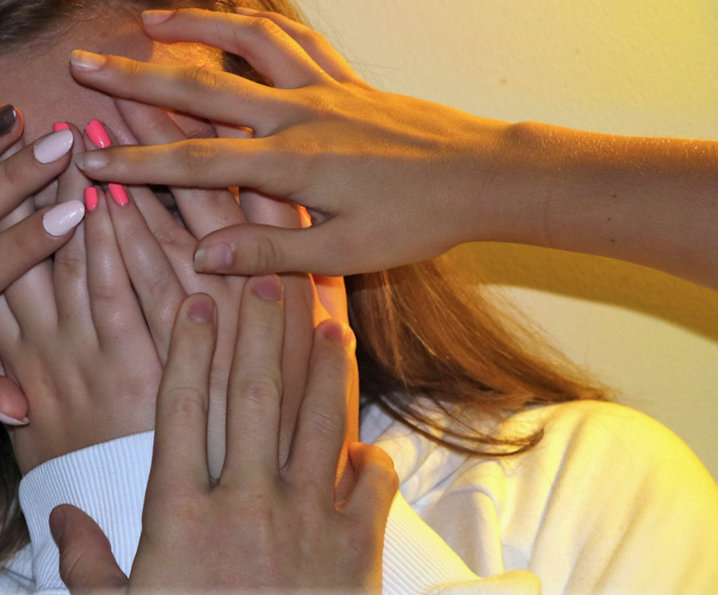Homework and Stress
STORY BY KHLOE CRAWSHAW »
With every new school year
comes more work. More home-
work, more practices, more everything.
More chances for a student’s mental
health to decline, and possibly the
reason for mental illnesses on the rise.
Some students blame the stress
and anxiety on homework, but is it
really the culprit? Can too much home-
work really be the cause of anxiety,
depression, or overall have negative
effects on someone’s mental health?
Eudora Schools Psychologist, Brian
Keegan, says that homework definitely
isn’t the only cause of mental health
problems.
“Homework isn’t always a bad
thing. It gives parents the opportuni-
ty to take an active role in a child’s
education,” said Keegan, “It’s when
homework is excessive that negative
effects on mental health can be seen.”
Keegan also noted that excessive
amounts of homework can cause other
problems in student’s lives.
“It forces people to have poor eating
habits for convenience and time to
work, and that can lead to weight
loss or weight gain,” said Keegan. He
acknowledged that excessive home-
work can have an effect on a students
mental and physical health, and he
also made it clear that extracurricular
activities are the opposite of a bad
thing for students, even with stress
from homework.
“With as busy as students can be,
sometimes too much homework can
make them not wanting to be social,”
Keegan said. “The idea of school activ-
ities is to help balance stress and life,
and that’s necessary for student life
with healthy mental states,”
He also pointed out that mental
illnesses are not caused by high school
and homework alone.
“Sometimes kids can have under-
lying conditions they don’t even know
exist,” Keegan said, “and that’s when
they are given too much work, and
then those conditions can come up,”
Teachers tend to agree with Mr.
Keegan. Too much homework can
negatively affect mental health and
cause mental illnesses to worsen, but
that it isn’t the root cause. Mrs. Swann
thinks that homework can sometimes
get to be too much, and realizes that
sometimes teachers can assign busy
work. But, she also thought that the
stress can also be student driven, like
procrastination, but she also admitted
that it happens to everyone, student
and teacher alike.
“I think sometimes we as teachers
have higher expectations, and if you
have high expectations from all of your
teachers across the board that can
get really overwhelming. That can be
overwhelming, but good too.”
Mr. Tharp thinks that the stress
from school work can sometimes be a
good thing.
“I think there’s certain students
that are constantly dealing with
stress,” Tharp said, “and I think it’s
a good thing because you’re dealing
with it now as a 16- or 17-year-old, and
it’s not going to get better. Whether
its coping or medication, you need to
have those skills now instead of find-
ing out at 25 that you just can’t cope
with the stress.” said Tharp.
While students opinions vary from
teachers, most students can agree that
the amount of homework that feels like
too much is different from student to
student.
“If I can’t get it all done in one eve-
ning, personally I think it’s too much,”
said Junior Kjersten Inskeep. When
asked if she believed if homework
can be the primary cause for mental
illnesses like anxiety, she too believed
that homework alone isn’t usually the
reason.
“I’m a student and not an expert,
but I would say that school can be a
big root of it, but not the only thing.”
said Inskeep, “Genetics and personal
life working together with school to
cause those kinds of problems.”
Senior Nyah Coleman agrees with
Inskeep. She believes that sometimes
homework can come all at once, and
that makes it feel impossible to finish
it all.
“I blow things off really easily,”
Coleman said. “I feel like for other peo-
ple it can be really stressful when they
can’t get everything done.”
Sophomore Braden Beadleston
has his own opinion over the matter.
He thinks that while homework itself
doesn’t cause the anxiety, things like
procrastination or struggling with
understanding new and unfamiliar
concepts causes more stress than the
overall amount homework.
“There are times that stress from
homework will affect the way I function
during the day,” Beadleston said, “but
I don’t want to say that it damages my
mental health.”
In addition to depression and anx-
iety, Beadleston has been diagnosed
with trichotillomania, a disorder in
which people feel the persistent urge to
pluck or pull out their hair.
“The schoolwork is half to blame for
my trichotillomania,” Beadleston said,
“but it also has to do with stuff from
my past that continues to damage my
mental health to this day.”
However, stressful situations such
as struggling with homework do play
some sort of role.
“It’s times when I’m studying and
when I’m confused about a concept
being taught, that I pull out my hair
without me knowing,” Beadleston said.
Different people react to stress in
different ways. While some students
may blame extracurricular activities
like sports for reducing their home-
work time and thereby increasing the
amount of stress they experience, some
said that their extracurricular activities
actually help them manage it.
Nyah Coleman feels like her activi-
ties provide her with a sense of balance.
“I do Scholars Bowl and the musical,
and it affects my ability to do home-
work,” Coleman said, “but it’s better
for my mental health because I have a
creative outlet.”








